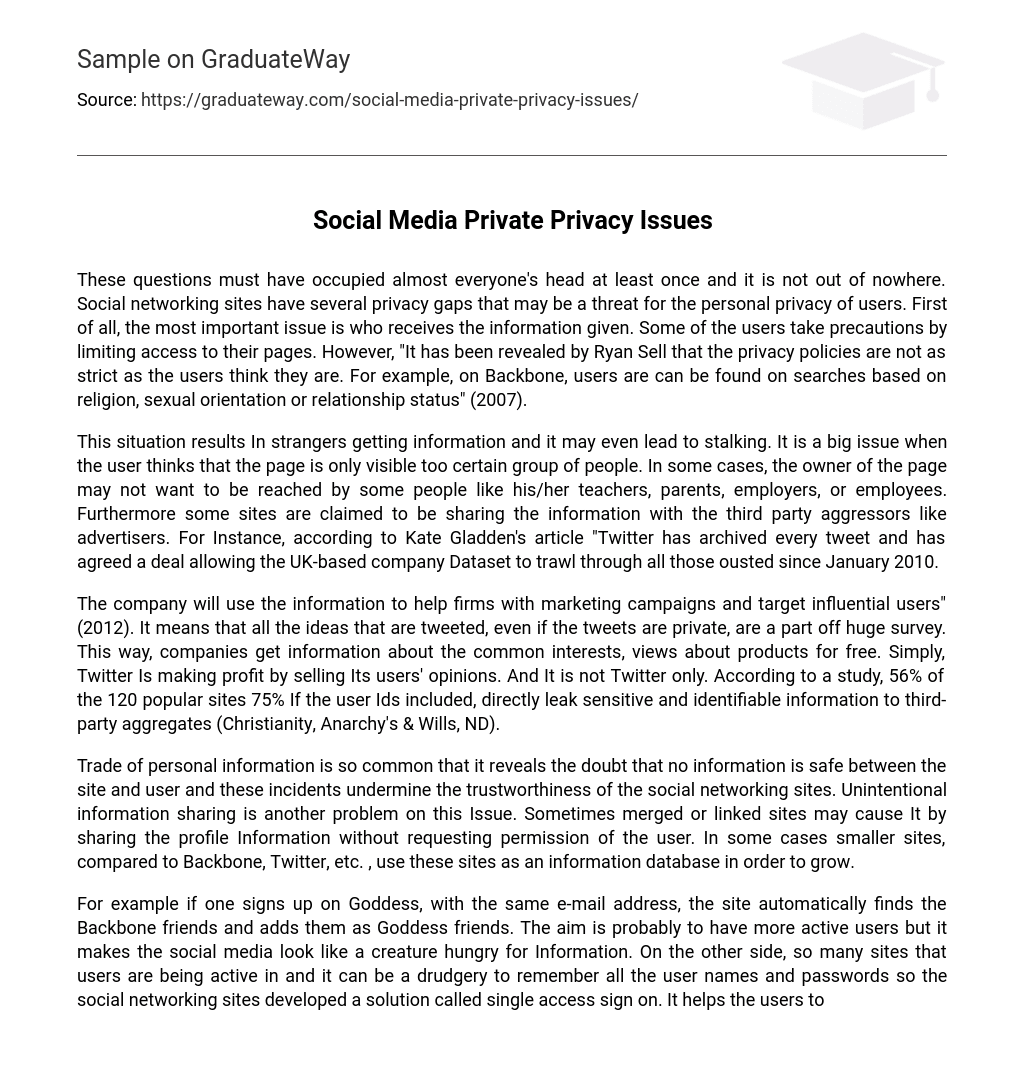Privacy concerns surrounding social networking sites are a topic that everyone has likely contemplated. This concern is justified, as these sites possess various vulnerabilities that can potentially compromise personal privacy. The primary issue revolves around the accessibility of shared information on these platforms. While certain users take precautions to restrict access to their profiles, Ryan Sell revealed in 2007 that the privacy policies implemented by these sites may not be as strict as users believe. For instance, on Backbone, users can be located through searches specifically targeting attributes such as religion, sexual orientation, or relationship status.
The situation of strangers obtaining information and the potential for stalking is a major concern when users believe their pages are only visible to specific groups. It can be especially problematic if the page owner wishes to avoid contact with certain individuals such as teachers, parents, employers, or employees. There are also cases where websites are accused of sharing information with third-party aggressors like advertisers. For example, in Kate Gladden’s article, it is mentioned that Twitter has archived every tweet and reached an agreement with a UK-based company called Dataset to analyze all tweets posted since January 2010.
The company plans to utilize this information to assist businesses in their marketing campaigns and target influential users (2012). Essentially, all ideas shared on Twitter, even those in private tweets, are considered part of a comprehensive survey. Consequently, companies are able to obtain information about common interests and perspectives on products at no cost. In essence, Twitter generates revenue by selling its users’ opinions. This practice is not exclusive to Twitter alone. A study revealed that 56% of the 120 popular sites analyzed leaked sensitive and identifiable information directly to third-party aggregates, with 75% of this leakage including user IDs (Christianity, Anarchy’s & Wills, ND).
It is evident that personal information trade is widespread, which raises concerns about the safety of information shared between websites and users. These incidents erode trust in social networking sites. Additionally, unintentional information sharing is another issue that arises from the merging or linking of sites, where profile information is shared without user consent. Smaller sites often use larger platforms such as Facebook and Twitter as databases to expand their own information resources.
The website Goddess has a feature that automatically adds a user’s friends from Backbone as friends on their platform if they register using the same email address. While this may be seen as an effort to boost user activity, it can also give the impression that the social media site is excessively eager for personal information. Nonetheless, numerous websites necessitate user engagement, making it challenging to manage multiple usernames and passwords. To address this issue, social networking sites have introduced single access sign-on, enabling users to log in to smaller sites using their Backbone or Twitter accounts.
The harmless application initially seems beneficial, but as users link multiple sites together, protecting their initial information becomes more challenging. For instance, if someone uses their Backbone account to sign on to gag, not only will their comments and liked posts be visible to their Backbone friends, but their personal information will also be accessible to gag users. Some argue that information sharing is only a problem if one engages in unethical or illegal activities. However, this viewpoint is shallow as there are numerous cases where unfair information acquisition can pose a threat to users.
Accusations can negatively impact users and potentially harm their professional lives. Employers often research candidates online before interviews, and certain findings, like unprofessional photos, can decrease the candidate’s chances of being hired. Additionally, there have been cases where individuals were fired due to actions considered “inappropriate” on social media platforms. In 2008, Virgin Atlantic terminated thirteen cabin crew members for their use of a social networking site, stating that their behavior had damaged the company’s reputation (BBC News, 2008).
The employees representing the company are feeling pressure due to the belief that they embody the firm. Additionally, the lack of privacy for personal information on social networking sites poses a significant issue for these individuals. Furthermore, certain websites, such as gag, Hugely, Reedit, or Achaean, primarily serve as platforms for enjoyment. Users on these sites may choose to maintain anonymity, resulting in the occurrence of ridicule. Those who would not mock others in person often become bullies on these platforms, and the exposure of fictional individuals is becoming increasingly prevalent in the name of entertainment.
Unauthorized posting of ‘funny’ photos, videos, status updates, or tweets on social networking sites is prevalent due to the absence of rules or regulations preventing such unjust treatment. Consequently, it becomes extremely difficult to have these posts removed by site operators. Overall, the existence of privacy policy violations or gaps on social networks not only raises ethical concerns but also leads to the aforementioned problems. To address these issues effectively, users and site operators alike must acknowledge the gravity of the consequences.





